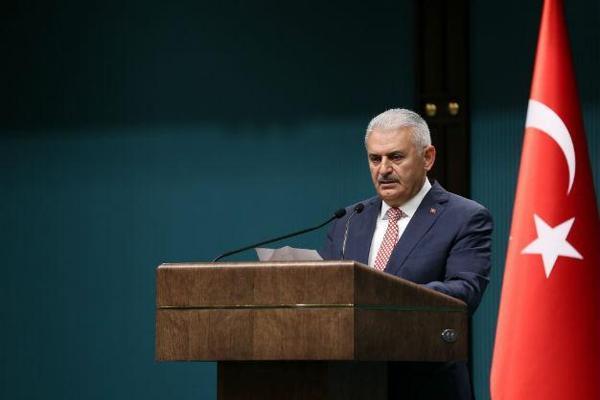Erdoğan to chair first meet of Yıldırım gov’t
Serkan Demirtaş - ANKARA


AA photo
Prime Minister Binali Yıldırım unveiled his new cabinet on May 24 after lengthy midnight consultations with President Recep Tayyip Erdoğan, switching nine ministers but keeping most key figures in their jobs.Erdoğan will chair the first cabinet meeting at the presidential palace on May 25 in the first confirmation that Yıldırım intends to pursue a “low profile,” although the new premier did say his government would focus on “increasing the number of friends and reducing the number of enemies” in foreign policy.
Yıldırım rushed to parliament to read out the governmental program just three hours after Erdoğan approved Turkey’s 65th government.
The new 26-seat government features nine new ministers and four re-seated ministers, while the number of female cabinet members dropped from two to one, with Fatma Betül Sayan Kaya becoming the only minister in the family and social policies portfolio.
The nine ministers to lose their seat in the cabinet are ex-Prime Minister Ahmet Davutoğlu, Culture and Tourism Minister Mahir Ünal, EU Minister Volkan Bozkır, Health Minister Mehmet Müezzinoğlu, Development Minister Cevdet Yılmaz, Family and Social Policies Minister Sema Ramazanoğlu, Environment and Urban Planning Minister Fatma Güldemet Sarı, Economy Minister Mustafa Elitaş and Deputy Prime Minister Yalçın Akdoğan.
EU under Ömer Çelik’s control
Bozkır’s departure from the EU Ministry was a surprise, given that he is an experienced diplomat who recently made a positive contribution in brokering the migrant deal with the EU. However, the deal that also included visa waivers for Turkish citizens was strongly criticized by Erdoğan, who underlined that Turkey would not negotiate with the EU over the terror clause in the visa liberalization deal. Ömer Çelik, one of the closest aides to Erdoğan, also criticized the EU in strong words in his capacity as the deputy leader and the spokesperson of the AKP.
Foreign Minister Mevlüt Çavuşoğlu will also continue as the top diplomat in the new era and will focus more on restoring foreign policy.
Akdoğan and Ünal were involved in the Kurdish peace process until early 2015 and their departure from the government is seen as a reflection of Erdoğan’s continued disturbance with a February 2015 deal between the government and the pro-Kurdish Peoples’ Democratic Party (HDP), known as the Dolmabahçe Contract.
The peace process has since fallen into tatters among heightened conflict in Southeast Anatolia.
Şimşek in, Zeybekci returns
The new government illustrates a degree of balance in regards to the management of the economy. Despite expectations, Deputy Prime Minister Mehmet Şimşek kept his position, which will provide assurances to foreign markets. On the other hand, Nihat Zeybekci returns to the cabinet as an economy minister who will likely focus on the production-based growth nature of the Turkish economy. As Yıldırım said in a group speech on May 24, the government will not take steps backward on financial discipline but will also concentrate on production and employment.
Finance Minister Naci Ağbal also kept his position while former Customs Minister Nurettin Canikli has returned to the cabinet as a deputy prime minister. Müezzinoğlu was replaced by Recep Akdağ, who has previously been a health minister under different Erdoğan governments.
Among first-time ministers is Deputy Prime Minister Veysi Kaynak, who served as a deputy minister in the Justice Ministry. Mehmet Özhaseki, a former mayor of Kayseri, will serve as the environment and urban planning minister, while Faruk Özlü was appointed as science, technology and industry minister.
Former Science, Technology and Industry Minister Fikri Işık has been reappointed as the defense minister, while his predecessor İsmet Yılmaz will serve as education minister. Former Education Minister Nabi Avcı, meanwhile, will assume the culture and tourism portfolio.
Deputy Prime Minister Lütfi Elvan unexpectedly retained a place in the government, becoming development minister despite anticipation that he would lose his position due to his close ties to Davutoğlu.
Other key figures in the government to retain their positions were deputy prime ministers Numan Kurtulmuş and Tuğrul Türkeş, Justice Minister Bekir Bozdağ and Interior Minister Efkan Ala.
